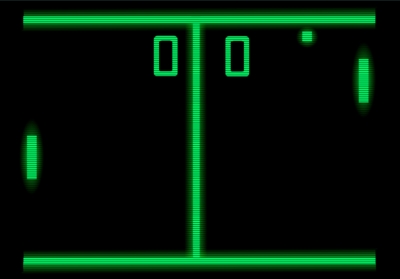A Brief History of the (Gaming) Universe
Before we delve into the complexities of portal physics, we must first learn about the basics that got us here.
IMAGE SOURCE: http://blogs.nyu.edu/blogs/gc69/stdin/Spacewar1.png
1962
Spacewar! is among some of the first computer games developed. The gameplay is fairly simple duelling between two spaceships. While the graphics were primitive compared to todays, it did contain the option to turn on some basic physics, i.e. gravity. Turning on gravity in the game added a level of complexity by affecting the trajectory of the ships in motion, as well as their weapons fire trajectory. This particular aspect of physics is better know as Angular Momentum.
IMAGE SOURCE: http://boelling.com/daily/images/uploads/pong.jpg
1970s
The video game Pong is introduced. While this gameplay was rather simple, two paddles hitting a ball back and forth, it also employed some basic physics principles. The game uses some basic physics equations to determin how the ball bounces off the paddle. Pong is later adapted into a single player game commonly know as Breakout. Using the same basic phyics, except this time to demolisha structure made of bricks.
IMAGE SOURCE: http://www.bostongaragebands.com/arcade%20games/super_mario_bros_javascript.gif
1980s
The most recognizable video game character to date makes his appearance (along with his brother). Super siblings Mario and Luigi debut on the Nintendo Entertainment System. While many of us today don't even take notice of the physics present in the game, it does in fact possess some basic physics principles that we know intuitively.
The two big physics principles applied in the game are momentum and friction. Momentum can be seen in Mario's movements. When Mario jumps his speed carries over. In other words, when Mario is running, and jumps, he jumps further than he would have had he been walking and jumped. Friction can also be seen in action in Super Mario games by observing what happens when Mario stops abruptly after running some distance, Mario slows down to a stop. Friction, or lack thereof, can be seen in the Super Mario Bros. 3 game in which Mario slides around on ice in one world of the game. While all of these applications of physics may seem rather simple, the help to make the game, or characters in it, act like we would expect them to in real life.


